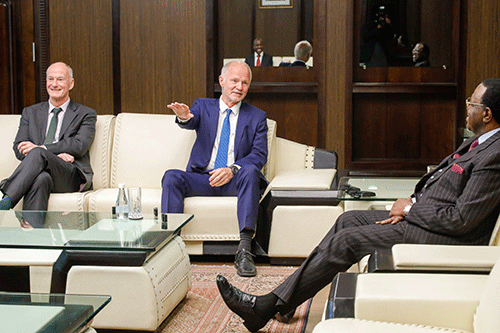An impending deal with the European Union to jolt Namibia’s ambitious green hydrogen sector and at the same time reduce the economic bloc’s own dependence on Russian energy
means the fruits of recent economic diplomacy efforts, as witnessed over the past few months, are becoming visible.
This is according to presidential economic advisor and Namibia’s green hydrogen commissioner, James Mnyupe.
“This will result in Namibia diversifying its potential export market into Europe for the green ammonia we expect to start producing in 2025/26, and likely lead to us opening up new sources of concessionary capital (foreign direct investment) that will help fund the project here in Namibia,” Mnyupe told New Era yesterday in response to the implications of the imminent deal.
Yesterday, Germany’s green hydrogen envoy Rainer Baake said his country is keen on supporting Namibia’s ambitions of achieving large-scale, low-cost renewable energy development, and designing models for sustainably maximising fiscal revenue. This, he said, would boost local development in renewable energy investments and green ammonia production. He was speaking during a courtesy call on President Hage Geingob at State House.
According to Baake, Namibia can expect a stable market for its new green products in Europe, mainly because the EU has set emission reduction targets which their various industries have to meet.
“Europe is not going to be self-sufficient in energy terms. We can produce all the electricity we need for comprehensive electrification, and we will also produce hydrogen, but not all. About two-thirds of it we will have to import,” the envoy explained. Baake added that both the EU and Germany decided to become climate-neutral; the EU by 2050, and Germany by 2045.
The German green hydrogen agent specified the way to reach climate neutrality would require the electrification of all
different sectors in Germany and the wider European communities.
Big opportunity
He noted that Germany is the biggest producer in consumable ammonia, and actually currently produces an astonishing six
million tonnes of carbon dioxide, the main gas linked to global warming.
Baake explained: “The big opportunity for this product is that in the future, Namibia might export green renewable energy-produced ammonia to Germany that will be carbon dioxide-free. This will be helping us with decarbonisation, and Namibia will
have a very valuable product.”
Furthermore, he applauded Namibia for deciding on harnessing its solar and wind resources to produce products which industrialise, which are needed in the current era. “Your solar energy can produce about three times the amount of energy as ours.
There is no other place that has better conditions than Namibia,” the visitor observed. At the same occasion, President Geingob said the potential of the new industry is massive, and can assist Namibia in tackling many challenges. He added that through this potential of green energy and green exports, a new image is awaiting Namibia in the future.
Green hydrogen and ammonia are articulated in the second Harambee Prosperity Plan’s economic advancement pillar as a transformative strategic industry.
EU deal
International news agency Reuters this week reported on Namibia’s possible hydrogen deal with the EU.
They quoted director general of the National Planning Commission, Obeth Kandjoze, as saying “work was underway for a deal on green hydrogen”. Reuters also reported that the EU wanted more access to Namibia’s minerals, but Kandjoze was mum on that subject. The EU, however, declined to comment on the possible deal, saying only that it was working on green hydrogen projects in Namibia. “Hydrogen has long been touted as a less emissions-heavy alternative to fossil fuels. But while it has seen some uptake in the EU, chiefly in heavy industry and transportation, high costs and a lack of infrastructure have limited consumption, and the fuel covers just 2% of the bloc’s energy needs,” Reuters stated.
The German government has already agreed to invest over N$685 million (40 million euros) in Namibia’s green hydrogen sector, while Belgian and Dutch companies are also operating in the country in that field.
Meanwhile, Israel and Egypt aim to boost natural gas exports to the EU under a memorandum of understanding (MoU) signed on Wednesday. This is as Africa hopes to step in to secure EU exports as Russian energy is replaced.
Under the MoU, the EU will encourage European companies to participate in Israeli and Egyptian exploration tenders.


